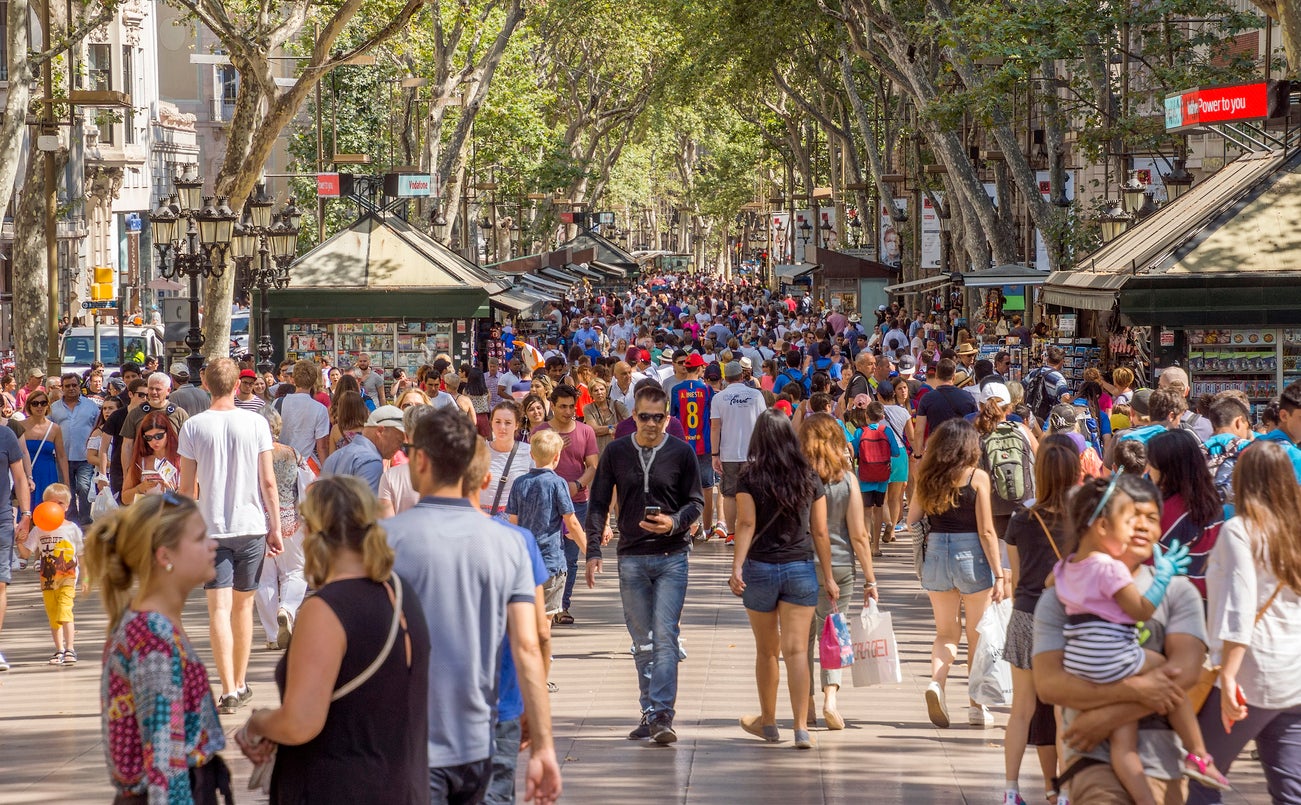Barcelona is banning Airbnbs – Britain should take back control, too
As the Catalan capital pledges to eradicate short-term tourist rentals by the end of the decade, Paul Clements wonders if forcing visitors back into hotels might be a blueprint that would work for our hollowed-out seaside resorts, from Kent to Cornwall


I hear the Mediterranean is revolting this time of year. It certainly will be for some this summer. A growing anger, from Barcelona to the Balearics, is threatening to turn the most popular holiday hotspots into hostile ground for the tourists they once welcomed.
The islands of Mallorca, Menorca, Ibiza and Formentera have already been hit by protests, with 10,000 locals marching through Palma. Earlier this month, sunbathing tourists on an isolated beach popular with Instagram influencers were jeered and forced off it so that residents could have it to themselves for a change. The Balearic president has declared that Mallorca’s 20 million tourists a year “is not sustainable”, and that measures to limit visitors can no longer be ruled out.
Then, last weekend, the mayor of Barcelona restated his opposition to the short-term letting site Airbnb – a lightning rod for protests about the “crime” of over-tourism – by pledging that there will be no rental apartments for visitors in his city by the end of the decade.
His refusal to issue new licences and not renew existing ones comes amid public outcries against the mass tourism that has seen a city of 1.6 million residents receive more than 30 million visitors a year.
In 2016, Barcelona became the first major European city to fine Airbnb for users letting out unregistered properties and, later, to ban short-term private room rentals altogether, as part of its campaign to crack down to dissuade tourists from using short-let booking apps and to push visitors back into hotels. Some 3,500 apartments are already said to have been returned to the city’s local housing market.
In clamping down, you might say Barcelona is taking back control of its private rental sector from the disruptor platform – and there are plenty of places in Britain that would like to follow their lead, too.
Since it launched across Europe in 2010, Airbnb has dramatically reshaped short-term lettings markets, depleting housing stock with a negative knock-on for residents’ rents. It has warped neighbourhoods, too. Family-run supermarkets that for generations have catered for locals have been inched out by tourist cafes, bike rentals and souvenir shops.
Yes, the app helped create new demand and enabled billions to flow into local economies. It has stretched the average tourist’s length of stay, which has only added to local incomes and enabled more than $10bn in tourism taxes to be generated around the world. But with hordes of visitors comes great irresponsibility.
The revolving door of tourists can shatter the peace, from the notorious “party pads” with hot tubs in quiet villages, to the unwelcome sound of wheelie suitcases being trundled down the corridor of a residential apartment block in the middle of the night.
Initially, Airbnb was sold as the place to find a room going spare or a sofa to surf. But the trouble with “democratising” travel is that everybody can do it. The freedom to live like a local and explore a neighbourhood like it’s your own means you can also misbehave like you own the place, too – to drive it like you stole it.
Just ask the residents of Britain’s prettiest seaside villages – if you can find them. Out of season, the likes of Robin Hood’s Bay in North Yorkshire, Whitstable in Kent and Mousehole in Cornwall are often pitch dark; nobody’s home, because few can afford to live there these days, thanks to all the holiday lets that no one much fancies in deepest February. These towns are becoming like a ghost town.
Meanwhile, in London, cash-strapped councils have accused holiday platforms of not doing enough to prevent local authority housing from being illegally sublet to tourists for vast profits – and at a time when thousands of people are on waiting lists for full-time accommodation. (One housing association tenant was reportedly found to have made £4,000 a week from subletting their property to tourists.)
There was a time when we used to love a market disruptor. In a similar way that the arrival of “no-frills” airlines in the 1990s rapidly brought down the price of return flights, and Uber ended black cabbies’ nice little earner, holiday rental app revolution – made possible by smartphones and sleek online booking interfaces – seemed to pull a rug from beneath hotels that could once overcharge for a bed for the night.
But there’s always a catch – and it’s not just the vast council tax shortfall involved. In my experience, Airbnb and its rival platforms are rarely fuss free.
Tim Dillon, a US stand-up and podcaster, has a nice line about the downside of staying in the spare rooms advertised on Airbnb, which has misanthropic echoes of Jean-Paul Sartre: “The problem is that people are terrorists – their homes are filthy and disgusting. There are 150 rules including ’Don’t wake the neighbour. She’s works nights!” Or dumb recommendations: ‘Try Claudia’s Pancake Hut – local fav!’ Just buy a van and sleep in that.”
I might do just that. These days, I am allergic to Airbnb, ever since I was kicked out of an apartment in Alghero in high season, for complaining about the gabba DJ broadcasting into the night at the open-air funfair next door, a facility unmentioned in the listing description.
You’d think I’d have learned my lesson, but this summer I’ve booked to go to Mallorca. I’ll be sure to pack an “Ocupem les Nostres Platges” T-shirt, just to throw the anti-tourist protesters off the scent.
Join our commenting forum
Join thought-provoking conversations, follow other Independent readers and see their replies
Comments
Bookmark popover
Removed from bookmarks